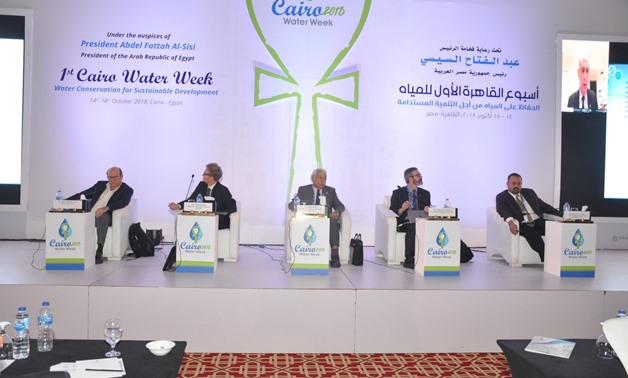
Egypts first Cairo Water Week (CWW) kicked off on Sunday under the auspices of President Sisi, aiming at increasing the public awareness of water rationalization for the sustainable development amid state of water shortage - Press Photo
CAIRO – 19 October 2018: A promotional session for Lake Victoria-Mediterranean Sea navigation line-linking project was held on the sidelines of the Egyptian first Cairo Water Week on Tuesday, Oct. 16.
It introduced the current state of the project, its latest developments, in addition to the required resources for the completion of feasibility studies. It is expected that the first phase of the project will cost around $ 5.6 million.
Throughout the session, examples of navigation projects that were conducted on international rivers such as the Rhine, the Danube, the Congo, Senegal, Niger and the Mekong were presented. These navigation projects aim to support development of their countries and raise their people’s living standard through sustainable water management.
The participants stressed that this project strongly support economic developments and regional cooperation between Nile Basin Countries in various fields as it’s a route that will facilitate the transportation of people and goods between these countries. It will also serve the Nile Basin countries that have no access to the seas and oceans.
They stressed the importance of moving forward in the project regardless of its completion period as its normal for these kinds of projects to take long time.
In another session, Director of the Egyptian committee for the Lake Victoria-Mediterranean Sea navigation line-linking project Tahany Saleet asserted the importance of studying the Nile River as the longest waterway in the world. She referred to the importance of transport between countries for regional integration and revealed more details of the project. Basin countries need to cooperate to benefit together from the Nile.
Saleet stated that efforts were being made to find common points, which revolve around the general goal of “one continent, one river, and one people.”
This project is aimed to find a sustainable means of transport to reduce poverty among the Nile Basin countries.
“In order to achieve this, we need more studies on the components of the project namely navigational corridors, infrastructure, rehabilitation centers for the workforce, and legal and institutional frameworks and agreements between African countries”, Saleet said.
During the session, Saleet asserted that the framework of the linkage project is increasing and the stakeholders are increasing. She also confirmed that preliminary feasibility studies have been conducted by Egyptian experts and approved.
She said that the outcomes of the preliminary feasibility study divided the Nile into five sectors. The study led to proposing six channels of transport, most notably the one through the Nile, through the establishment of the navigational linkage corridor.
Ethiopia has requested to annex the Baro River, which COMESA agreed to, and Sudan requested to annex the corridor extending from Wadi Halfa to Khartoum, which was also approved, she said.The Congo requested the annexation of the Smeliki River, as well, Saleet said.
Saleet stated that the project would be implemented with a grant from the African Development Bank of US$650,000, pointing out the project needs more studies and training programs.
To create mutual benefits for the Nile Basin Countries, Egypt has proposed a notion to create a trade shipping route starting from Lake Victoria in Central Africa to the Mediterranean Sea, also known as the VICMED project.
In case you missed it
CAIRO - 18 August 2018: To create mutual benefits for the Nile Basin Countries, Egypt has proposed a notion to create a trade shipping route starting from Lake Victoria in Central Africa to the Mediterranean Sea, also known as the VICMED project. Egypt, which suffers from water scarcity, has launched the notion of a shipping route in 2013.
Egypts first Cairo Water Week (CWW) kicked off on Sunday under the auspices of President Sisi, aiming at increasing the public awareness of water rationalization for the sustainable development amid state of water shortage.
The four-day CWW is being held in cooperation with the European Union and the United Nations’ Food and Agricultural Organization (FAO) to tackle water issues, amid climate change that impacts the world’s freshwater. In March 2016, the United Nations Environment Program warned that 50 percent of the world’s population would face “severe water stress” by 2030.
The 2018 CWW is launched under the title “Water Conservation for Sustainable Development”. It aims at fostering awareness of water issues for sustainable development, facing water challenges via non-traditional methods and modern technology, and supporting implementation of integrated water management.
On the sidelines of the CWW, the African Young Water Professionals Forum was held, gathering 24 young people from 12 African countries of Egypt, Sudan, Kenya, Uganda, South Africa, Nigeria, Malawi, Tanzania, Mauritania, Ethiopia, Ghana , and Morocco.
Meanwhile, the fourth session of the Islamic Conference of OIC for Water Ministers, held on Sunday, Oct. 14 on the sidelines of the CWW.

Comments
Leave a Comment